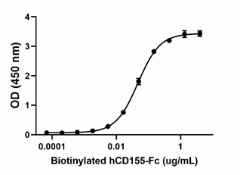- Regulatory Status
- RUO
- Other Names
- Poliovirus Receptor, PVS, Nectin-Like 5, NECL-5
- Ave. Rating
- Submit a Review
- Product Citations
- publications

-

Biotinylated recombinant human CD155-Fc chimera binds to immobilized recombinant human TIGIT at 2 µg/mL in a dose-dependent manner. The ED50 for this effect is 20 – 100 ng/mL. -

Stability Testing for Biotinylated Recombinant Human CD155-Fc Chimera. Biotinylated recombinant human CD155-Fc chimera was aliquoted in PBS, pH 7, 10% glycerol at 0.2 mg/mL and one aliquot was kept at 4°C (Control), and another was frozen and thawed four times (4x Freeze/Thaw). After this procedure, the samples were tested for their ability to bind to immobilized recombinant human TIGIT at 2 µg/mL in a dose-dependent manner. The ED50 for this effect is 20 – 100 ng/mL.
| Cat # | Size | Price | Quantity Check Availability | Save | ||
|---|---|---|---|---|---|---|
| 796604 | 25 µg | 184€ | ||||
| 796606 | 100 µg | 423€ | ||||
PVR/CD155 is a transmembrane adhesion protein that belongs to the immunoglobulin superfamily. It possesses three immunoglobulin-like domains, a transmembrane domain, and the intracellular domain. PVR/CD155 is encoded by eight exons and differential mRNA splicing results in four isoforms named PVRα, PVRβ, PVRγ, and PVRδ. The alpha and delta isoforms are membrane attached and the beta and gamma are soluble. The isoform PVRβ has a partial sequence and PVRγ lacks exon six, which codifies the transmembrane domain. The extracellular domain is identical in all the isoforms and binds to the polio virus; therefore, the soluble forms compete with the membrane attached isoforms for the binding of the virus. PVR/CD155 is expressed in multiple tumors such as colorectal, gastric, multiple myeloma, myeloid leukemias, ovarian cancers, and melanoma. CD266 is expressed in CTL and NK cells and binds to PVR/CD155 expressed in cancer cells. This indicates that CD226 may contribute in the immunity against PVR/CD155+ cancer cells. High levels of soluble forms of CD155 (PVRβ and PVRγ) have been detected in the serum of patients with cancer. As a result, sCD155 may be a useful biomarker in cancer progression.
Product DetailsProduct Details
- Source
- Human CD155, amino acid (Asp28-Asn343) (Accession: NP_006496.4), with a linker (GS), a C-terminal human IgG1 (Pro100-Lys330) and an Avi-tag, was expressed in CHO cells. Human CD155-Avi tag was site-specifically biotinylated by enzyme BirA.
- Molecular Mass
- The 564 amino acid recombinant protein has a predicted molecular mass of approximately 62.3 kD. The DTT-reduced and non-reduced protein migrates at approximately 90 kD and 180 kD by SDS-PAGE, respectively. The predicted N-terminal amino acid is Asp.
- Purity
- > 95%, as determined by Coomassie stained SDS-PAGE
- Formulation
- 0.22 µm filtered protein solution in PBS, pH 7.2, 10% glycerol.
- Endotoxin Level
- Less than 0.1 EU per µg of protein as determined by the LAL method
- Concentration
- 25 µg size is bottled at 200 µg/mL. 100 µg size and larger sizes are lot-specific and bottled at the concentration indicated on the vial. To obtain lot-specific concentration and expiration, please enter the lot number in our Certificate of Analysis online tool.
- Storage & Handling
- Unopened vial can be stored between 2°C and 8°C for up to 2 weeks at -20°C for up to six months, or at -70°C or colder until the expiration date. For maximum results, quick spin vial prior to opening. The protein can be aliquoted and stored at -20°C or colder. Stock solutions can also be prepared at 50 - 100 µg/mL in appropriate sterile buffer, carrier protein such as 0.2 - 1% BSA or HSA can be added when preparing the stock solution. Aliquots can be stored between 2°C and 8°C for up to one week and stored at -20°C or colder for up to 3 months. Avoid repeated freeze/thaw cycles.
- Activity
- Biotinylated recombinant human CD155-Fc chimera binds to immobilized recombinant human TIGIT at 2 µg/mL in a dose-dependent manner. The ED50 for this effect is 20 – 100 ng/mL.
- Application
-
Bioassay
- Application Notes
-
BioLegend carrier-free recombinant proteins provided in liquid format are shipped on blue ice. Our comparison testing data indicates that when handled and stored as recommended, the liquid format has equal or better stability and shelf-life compared to commercially available lyophilized proteins after reconstitution. Our liquid proteins are validated in-house to maintain activity after shipping on blue ice and are backed by our 100% satisfaction guarantee. If you have any concerns, contact us at tech@biolegend.com.
Antigen Details
- Structure
- Homodimer
- Distribution
-
Endothelial cells, cancer cells, widely distributed
- Function
- Regulator of the cell-mediated immune response, takes part in the transendothelial migration of leukocytes, mediates NK cell adhesion and activation. Acts as receptor of poliovirus.
- Interaction
- T cells, NK, cytotoxic T lymphocytes (CTL)
- Ligand/Receptor
- TIGIT, CD96, CD226
- Bioactivity
- Biotinylated recombinant human CD155-Fc chimera binds to immobilized recombinant human TIGIT in a dose-dependent manner using a functional ELISA.
- Cell Type
- Dendritic cells, Th17, Thymocytes
- Biology Area
- Adaptive Immunity, Cell Adhesion, Cell Motility/Cytoskeleton/Structure, Neuroscience
- Molecular Family
- Adhesion Molecules, Soluble Receptors
- Antigen References
-
- Meldenson CL, et al. 1989. Cell 56:855.
- Bottino C, et al. 2003. J Exp Med. 2003 198:557.
- Oda T, et al. 2004. Biochem Biophys Res Commun. 319:1253.
- Tahara-Hanaoka S, et al. 2006. Blood. 107:1491.
- Sullivan DP, et al. 2013. Am J Pathol. 182:1031.
- A Iguchi-Manaka, et al. 2016. PloS One 11(4): e0152982.
- Bowers JR, et al. 2017. Virus Res. 242:1.
- Gene ID
- 5817 View all products for this Gene ID
- UniProt
- View information about CD155 on UniProt.org
 Login / Register
Login / Register 














Follow Us